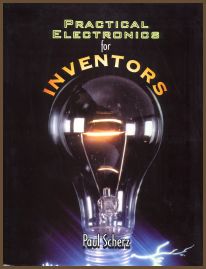
Practical Electronics for Inventors
by Paul Scherz
McGraw-Hill, 2000
605 pages, softcover
ISBN 0-07-058078-2
$39.95 list, $26.37 at Amazon.com (click to purchase)
Book reviewed 2004.07.24
This is the book for you if The Art of Electronics is too expensive or too deep for you. It won't take you as far as AoE will, but of what it does cover it does so much more intuitively.
On flipping through the book, the main thing you notice are the illustrations. The schematics are standard machine-drawn ones in the standard US style but most everything else was hand-drawn by the author. He's no Michaelangelo, and even in the most technical drawings he didn't use a straightedge. It is somewhat reminiscent of the Forrest Mims Radio Shack books, only on better paper and without the grid. This almost cartoony style serves to humanize the book's subject.
The book is a lot shallower AoE. In the page count as Scherz takes to describe every type of transistor, AoE covers everything a hobbyist needs to know just about bipolar transistors including some deep theory and many real application circuits. AoE covers FETs in another chapter that's about half again as long as the bipolar chapter. You will know a lot more about transistors from reading these two chapters of AoE than you will by reading the entirety of Scherz' book.
The Bottom Line
That's not to say that this book is bad. It's just a lot lighter than AoE. (Both figuratively and physically!) It's a gentler introduction to electronics, and a good refresher for a hobbyist who has had some prior electronics training. I can't imagine a professional keeping this one on their bookshelf in preference over AoE.
If you can only pick either AoE or the Scherz book, and you can afford either and you'll be sticking with the hobby for a long time, AoE is the better investment. If you're just a weekend putterer and would like to save a bit of cash, Scherz will probably be sufficient.
I'm not sure there's a very good case for getting both; I've found a few small things in Scherz that wasn't in AoE, but I'm not sure I've found $30 worth of differences. Perhaps the best argument in favor of getting both is that you've got AoE and have been struggling with the first six chapters. This book can probably get you over that hump so that AoE can begin paying off for you.
Related Resources
McGraw-Hill has a page dedicated to this book.
You can get more reader reviews at the Amazon.com link above.